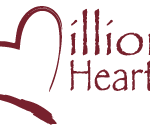
Public Health Community Advisory – The burden of cardiovascular disease in the United States is large and expensive, and the opportunity to improve the heart health of the nation is before us. Million Hearts aims to bridge the gap between public health and clinical practice through effective public policy, organizational systems change, focused clinical quality measurement, and the implementation of a wide breadth of complementary evidence- and practice-based interventions.
Million Hearts is a population-health initiative, jointly led by the Centers for Disease Control and Prevention and the Centers for Medicare and Medicaid Services. Million Hearts is committed to improving the cardiovascular health of the nation through policy and systems-level changes that impact both community and clinical practice interventions. Doing so will require a common agenda from which all partners can work, and focused outcomes by which all progress can be measured. It is a time-limited, concerted effort from public health, clinical, community, and advocacy stakeholders to improve risk factors for and subsequent outcomes of cardiovascular disease.
Million Hearts complements a number of existing public and private initiatives, including Healthy People 2020, Let’s Move! and Life’s Simple 7. The initiatives’ community-based interventions will focus on tobacco cessation, sodium reduction, and artificial trans fat elimination. These community interventions will be carried out in conjunction with a network of public health practitioners, including state and local departments of health, advocacy groups, and community-based organizations. Clinical practice policy and systems changes will improve performance on the delivery of underused clinical preventive services, specifically, aspirin use for those at risk for cardiovascular events, blood pressure control, cholesterol management, and smoking cessation, which will in turn improve cardiovascular health. It is our intention to present here the rationale behind the clinical intervention focus areas of Million Hearts and to outline the value of this integrated approach of public health and clinical practice.
Challenges arise in clinical practice that clinicians and the health care system alone cannot control. These include aspects of patient self-management, health literacy, and social determinants of health. Public health efforts, like Million Hearts, can assist with broad-reaching policy and systems changes that complement health care—efforts like payment models that align reimbursement with outcomes, full deployment of health information technology, team-based care, and accessible community services. Such overarching solutions can result in the provision of much-needed counseling or therapeutic services, help generate culturally and linguistically tailored health education materials, bring a skilled team together to help meet patient and caregiver needs, and give providers and patients tools to better manage risk factors or chronic conditions. Additional community-based population health efforts, such as sodium reduction in processed and restaurant foods, smoke-free laws, or public education, can make the communities in which we live, work, and play more supportive of health for all.
Only collective and complementary action will successfully tackle the big problem of preventing a million heart attacks and strokes. In these early months of Million Hearts, we are witnessing the formation of a network of networks as state and local partners, professional societies, advocacy organizations, organizations focused on quality improvement, and health information technology experts extend their work to develop synergies with others. Many are beginning to partner with each other in creative and effective ways. Million Hearts serves as a stimulus, a forum, and a celebrant of this work: a conduit for identifying effective practice-based strategies and evidence-based interventions, scaling solutions to maximize population reach, and translating them into tools and resources tailored to various audiences.
This article was written by Jamie K. Hahn, program manager, and Kari Majors, community health educator, for the Nebraska Heart Disease & Stroke Prevention Program with the Nebraska Department of Health and Human Services. http://dhhs.ne.gov/publichealth/Pages/cvh.aspx

